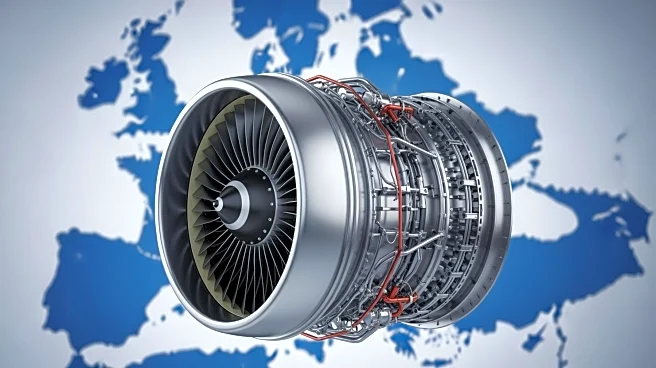What's Happening?
Aviation Week has released its 2026 Fleet & MRO Forecast, highlighting significant growth in the European air transport sector. Europe, excluding Russia, is expected to receive approximately 5,200 new
aircraft over the next decade, which will support fleet expansion and replace around 2,000 retiring aircraft. By 2035, the European fleet is projected to exceed 10,500 aircraft, driven by sustained demand for air travel and fleet modernization. Airbus is anticipated to dominate the market with a 55% share, followed by Boeing at 38%. The Airbus A320 family is expected to be a major contributor, representing over 40% of the fleet. The forecast also predicts a substantial demand for Maintenance, Repair, and Overhaul (MRO) services, with the market valued at over $350 billion. Engine maintenance will be the largest segment, with more than 21,000 engine overhaul events anticipated.
Why It's Important?
The projected growth in Europe's fleet and MRO market signifies a robust demand for air travel and aircraft maintenance services. This expansion is likely to benefit major aircraft manufacturers like Airbus and Boeing, reinforcing their market dominance. The increase in fleet size and MRO activities will also create opportunities for suppliers and service providers in the aerospace industry, potentially leading to job creation and economic growth. Additionally, the focus on fleet modernization may drive advancements in sustainable aviation technologies, aligning with global efforts to reduce carbon emissions in the aviation sector.
What's Next?
As Europe prepares for this fleet expansion, stakeholders in the aerospace industry may need to invest in infrastructure and workforce development to meet the growing demand for MRO services. Airlines and lessors might strategize to optimize fleet composition and maintenance schedules to ensure operational efficiency. The anticipated growth could also prompt regulatory bodies to update policies and standards to accommodate the increased air traffic and ensure safety. Furthermore, the emphasis on fleet modernization may encourage innovation in aircraft design and propulsion systems, potentially influencing global aviation trends.
Beyond the Headlines
The forecasted growth in Europe's fleet and MRO market could have broader implications for international trade and cooperation in the aerospace sector. As European airlines expand their fleets, there may be increased competition with carriers from other regions, potentially affecting global market dynamics. The focus on sustainable aviation technologies could also lead to collaborations between European and international entities to develop eco-friendly solutions, contributing to global environmental goals. Additionally, the expansion may influence geopolitical relations, as countries seek to strengthen their aerospace capabilities and partnerships.









